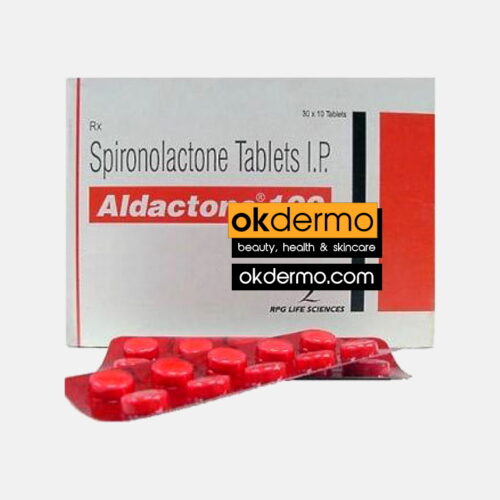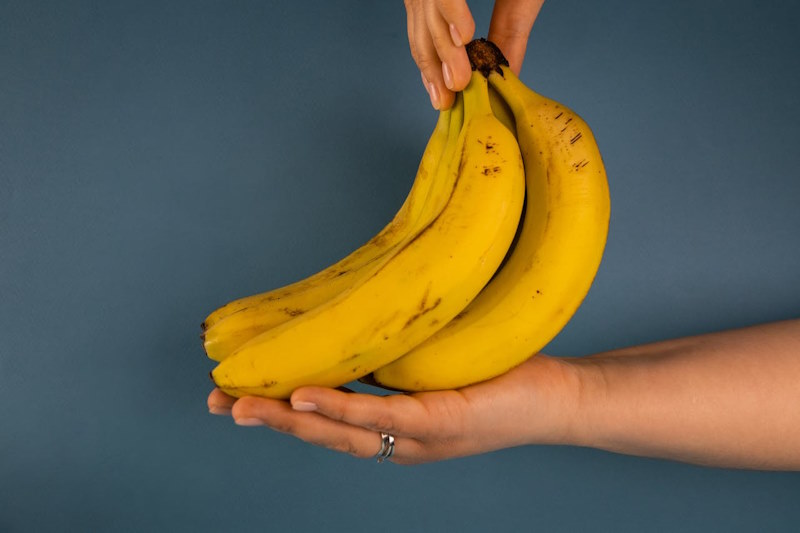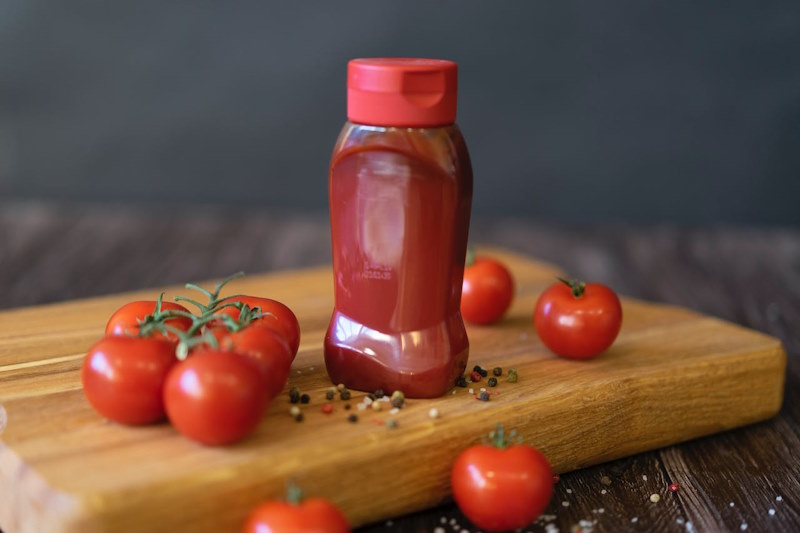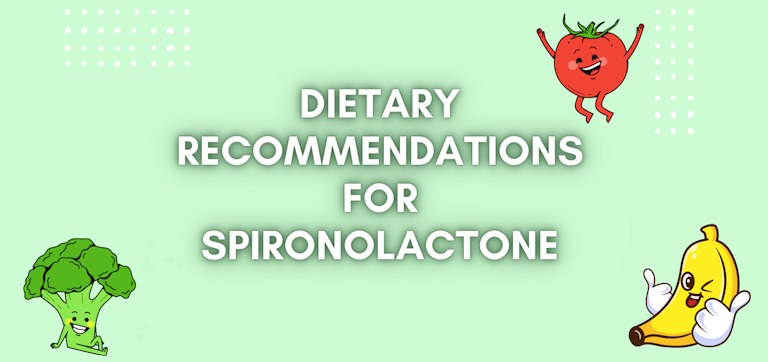Foods to Avoid While Taking Spironolactone
Table of Contents
A Comprehensive Guide on Dietary Recommendations for Spironolactone
Ensuring the effectiveness of certain medicinal drugs often extends beyond adhering to prescribed doses—it involves understanding how lifestyle choices, mainly dietary modifications, can impact treatment results.
For people prescribed Spironolactone, a medicinal drug commonly used to address various cardiovascular conditions, nutritional considerations particularly play a huge role in optimizing therapeutic advantages and mitigating potential adverse effects.
If you have also been prescribed spironolactone understanding which foods to avoid while taking spironolactone is quite important and might make all the difference in optimizing the maximum efficacy of it.
So, in this article, we’ll delve into the dietary considerations for individuals taking Spironolactone, which includes the role of potassium-rich meals like bananas, and offer guidance for maintaining a balanced diet while on this medication.
Spironolactone and Dietary Implications
Spironolactone belongs to the category of drugs known as potassium-sparing diuretics and is a medication commonly used to treat conditions originating from the cardiovascular system such as heart failure, hypertension, and edema.
-

Aldacton® Spironolactone Tablets
Spironolactone 25mg / 50mg / 100mg
Brand name: Hyles, CaroSpir
Size: 1 Strip of 75 Tablets
From USD $35.00 Select options
It works by blocking the action of aldosterone, a hormone that regulates sodium and potassium balance in the body. By inhibiting aldosterone, Spironolactone enables reduced fluid retention and lower blood pressure.
However, because Spironolactone can affect potassium levels differently compared to other diuretics, it’s important to be mindful of dietary choices that can alter the potassium balance in your body.
Spironolactone vs other diuretics
The drugs that belong to the category of diuretics, commonly known as water pills are of several types. These include Loop diuretics, thiazide diuretics, Potassium sparing diuretics and osmotic diuretics.
In general, most of these drugs are responsible for excreting excess fluid inside your body by increasing the urinary excretion of water and electrolytes like sodium and potassium.
Spironolactone and other potassium-sparing diuretics like eplerenone also increase urinary excretion of water and electrolytes in the identical passion but, unlike other varieties of diuretics, they spare the potassium levels in your body!
Dietary Implications
Based on this mechanism of action, research shows that consuming high-potassium foods whilst taking Spironolactone can potentially lead to hyperkalemia, a condition characterized by high potassium levels within the blood.
This can pose serious health risks, including arrhythmias – irregular heart rhythms and muscle weakness. Therefore, individuals prescribed Spironolactone are often advised to limit their consumption of potassium-rich foods.
Indications
In clinical settings, spironolactone is commonly indicated for the treatment of:
- Heart failure
- High blood pressure (hypertension)
- Hypokalemia (low potassium levels in the blood)
- Fluid retention (edema) due to congestive heart failure, cirrhosis, and nephrotic syndrome
Contraindications
Spironolactone should not be used if you have:
- Addison’s disease
- High levels of potassium in your blood (hyperkalemia)
- Inability to urinate.
- If you are also taking eplerenone
- When you are allergic to it.
Can You Eat Bananas on Spironolactone?
When talking about spironolactone, a very popular question that arises within the medical community is whether patients can be allowed to eat bananas, which contain high levels of potassium.
Did you know that one medium-sized banana contains approximately 400-450 mg of potassium that offers many health benefits, including cardiovascular and digestive support? However, this is exactly the reason why individuals taking Spironolactone may need to be cautious when consuming them.

The interaction between Spironolactone and bananas lies in their capability to raise potassium levels when consumed in excess.
While a single banana may not notably impact the potassium levels in most people, ones on Spironolactone therapy should especially be mindful of their overall daily potassium intake which includes other food sources such as potatoes, processed meats, oranges, and tomatoes.
Spironolactone Diet: Foods to Avoid and Dietary Recommendations
In addition to bananas, there are quite a few other foods that patients on Spironolactone should consider restricting or avoiding to keep their potassium levels well balanced. These include:
High-Potassium Fruits
Apart from bananas, there are several other fruits containing significant amounts of potassium that you need to be aware of when taking spironolactone. For instance, oranges are a common fruit rich in potassium with one medium-sized orange containing around 200-250 mg of potassium.

Melons, such as cantaloupe and honeydew, also contain 300-400 mg of potassium per cup of diced melon. Dried fruits like raisins and apricots are also high in potassium, with a small serving providing a substantial amount of potassium.
Vegetables
Potassium-rich vegetables must be consumed in moderation by patients taking Spironolactone. Potatoes, both white and sweet varieties, are among the most potassium-rich veggies with a medium-sized potato containing over 600 mg of potassium, depending on the type and preparation technique.

Tomatoes as well as tomato products like tomato sauce and tomato paste, are also rich in potassium.

Spinach, while highly nutritious, is another vegetable to watch out for because of its high potassium content. Similarly, avocados, despite their high nutritional values can be relatively high in potassium, hence should be eaten in moderation.
Processed Foods
Many processed and packaged meals generally include added potassium or sodium, which may contribute to raised potassium levels in body fluids in individuals taking Spironolactone. Common examples of these potassium-rich meals include packaged snacks, canned soups, and pre-made food.

Additionally, most processed meats like sausages, often include added sodium and potassium-based preservatives.
For this reason, you should always check the labels for potassium and sodium content and opt for low-sodium varieties whenever possible when selecting processed foods. Choosing whole, minimally processed foods is generally a healthier option for maintaining an optimal potassium intake in patients on Spironolactone.
Salt Substitutes
Nowadays, many individuals tend to use salt substitutes as alternatives to conventional table salt to lessen sodium consumption. However, many salt substitutes utilize potassium chloride to replace sodium chloride, which can pose a risk for people taking Spironolactone.
Potassium chloride can also contribute to increased potassium levels in the blood, mainly when consumed in massive portions. Therefore, people on Spironolactone must be aware of the potassium content in salt substitutes and may consult with a healthcare provider for guidance on appropriate alternatives.
While it’s vital to avoid ingredients excessive in potassium, it’s equally essential to keep a balanced meal plan that offers essential minerals and vitamins. Incorporating some low-potassium ingredients such as leafy greens, berries, and lean proteins can assist with fulfilling your daily dietary requirements while minimizing the risk of having hyperkalemia associated with spironolactone.
Hydration and Spironolactone: How Much Water Should You Drink?
In addition to nutritional considerations, good enough hydration is vital for individuals taking Spironolactone. Because Spironolactone increases urinary excretion of body fluids, staying hydrated helps prevent dehydration and electrolyte imbalance.
However, there is no specific recommendation for water consumption while on Spironolactone, but, aiming for 8-10 glasses of water per day is generally advisable to prevent you from getting dehydrated due to increased urination.
Tips for Managing Diet While Taking Spironolactone
Planning your dietary restrictions and modifications while on Spironolactone can be challenging, but with careful planning and awareness, it’s possible to maintain a healthy and balanced diet without compromising on essential nutrients. Here are some practical tips for managing your diet.

- Consult with Healthcare Provider: Before making any adjustments to your meal plan, it is always better to discuss with your healthcare provider or a registered dietitian as they can offer personalized recommendations based on your needs and clinical records.
- Monitor Potassium Levels: Regular monitoring of potassium levels through blood tests is another good practice when you are on potassium-sparing diuretics. Also, you should seek medical advice promptly, if you experience symptoms of hyperkalemia, such as weakness, fatigue, or irregular heartbeat.
- Read Food Labels: Make it a habit to read food labels and choose low-potassium options whenever possible. Also, keep in mind the fact that even small servings of high-potassium foods can contribute to your overall potassium intake.
- Focus on Variety: While certain foods may need to be restricted, focus on incorporating a diverse range of nutrient-dense foods into your diet that helps ensure that you’re meeting your nutritional needs for both micro and macro nutrients while minimizing the risk of any nutrient deficiencies.
Conclusion
In conclusion, maintaining a properly planned personalized diet is an essential aspect of managing Spironolactone therapy effectively. While bananas and other potassium-rich foods can be enjoyed in moderation, patients on Spironolactone should be mindful of their total daily potassium intake and make informed dietary choices accordingly.
By following these dietary recommendations, staying well hydrated, and working closely with healthcare providers, individuals can optimize the benefits of Spironolactone while minimizing potential risks.
FAQs
-
What not to eat while on spironolactone?
While on spironolactone, it is better to stay away from potassium-rich foods like bananas, oranges, potatoes, tomatoes, and avocados. Additionally, restrict the intake of processed ingredients, salt substitutes containing potassium chloride, and excessively salty foods.
-
What happens if I eat a banana on spironolactone?
Consuming a banana while taking spironolactone may increase your potassium intake, potentially leading to raised potassium levels in the blood. However, based on your total daily potassium intake this may or may not lead to symptoms of hyperkalemia.
-
What can you not mix with spironolactone?
Certain medications and substances may interact with spironolactone, including potassium supplements, other potassium-sparing diuretics, nonsteroidal anti-inflammatory drugs (NSAIDs), and ACE inhibitors. Alcohol and grapefruit juice may also interact with spironolactone and should be avoided or limited.
-
Should I drink a lot of water with spironolactone?
Adequate hydration is important while taking spironolactone, as it can increase urine production. Aim to drink at least 8-10 glasses of water per day, unless otherwise advised by your healthcare provider. However, individual fluid needs may vary, so consult with your doctor for personalized recommendations.
-
Can I eat bananas while on spironolactone?
While bananas are a nutritious fruit, they are also high in potassium. Therefore, if you’re taking spironolactone, it’s advisable to limit your intake of potassium-rich foods like bananas to avoid potential complications of hyperkalemia.
-
Can I eat dairy on spironolactone?
Dairy products are generally safe to consume while taking spironolactone. However, certain dairy products, such as milk, yogurt, and cheese, contain moderate amounts of potassium and should be consumed in moderation, particularly if you’re also consuming other potassium-rich foods.
References
- Pitt B, Zannad F, Remme WJ, et al. The effect of spironolactone on morbidity and mortality in patients with severe heart failure. Randomized Aldactone Evaluation Study Investigators. N Engl J Med. 1999;341(10):709-717. doi:10.1056/NEJM199909023411001
- Potassium and your CKD diet. National Kidney Foundation. https://www.kidney.org/atoz/content/potassium. Accessed January 27, 2024.
- Eating well with heart failure. British Heart Foundation. https://www.verywellhealth.com/congestive-heart-failure-diet-5208755 Accessed January 27, 2024.
- Leung AA, Wright A, Pazo V, Karson A, Bates DW. Risk of thiazide-induced hyponatremia in patients with hypertension. Am J Med. 2011;124(11):1064-1072. doi:10.1016/j.amjmed.2011.05.033
Post by:
Marcella Jiovanni
Skin Care Professional
“Marcella Jiovanni actively promotes the importance of maintaining healthy skin, she envisions the future of dermatology as moving away from pure medical, pharmacological dermatology and flowing more toward a holistic approach to wellness and skincare.”


















